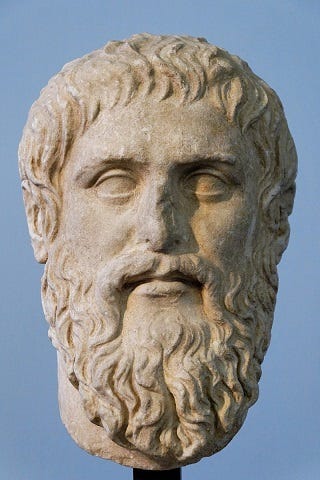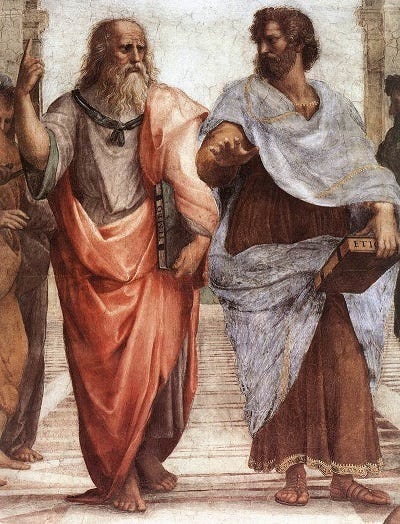What Happened When Plato Tried To Create His “Republic” In Real Life
Here’s a hint: he got a lesson from Niccolo Machiavelli
“There will be no cessation of evils for the sons of men, till either those who are pursuing a right and true philosophy receive sovereign power in the States, or those in power in the States by some dispensation of providence become true philosophers.”
— Plato, The Seventh Letter (360BC)
Likely you’ve heard of the name Plato, mainly through his dialogues. The most famous of these is The Republic, which describes the ideal state run by philosopher kings. This is usually where his ideas end — in a philosophical text.
But that’s not exactly true.
Plato attempted to create his ideal state multiple times within the same city. Each ended in failure. In one go around Plato even found himself opposed by a model ruler praised by Niccolo Machiavelli about 1500 years in the future.
In historian Will Durant’s Lessons of History, he states, “History is philosophy in action.” This episode of Plato’s life might be the epitome of that quote. It was also an odd meeting of The Republic and The Prince in a battle for the governance of a real-world city state.
Here’s a spoiler for you: it didn’t turn out well for Plato.
Plato’s Distain Of Politics
In Plato’s Seventh Letter he explains in his youth he was drawn to politics. After all, if he could master himself, why couldn’t he improve the city state around him? However, his ideals were soon shattered.
He witnessed the fallout of the Peloponnesian War, with Athens going from democracy to aristocracy led by tyrants, back to democracy again. Plato found each government lacking. Furthermore, the last two both prosecuted his teacher Socrates.
Between the terrible laws and government officials, he grew pessimistic and decided to sit back — leaving the unfit world of politics to politicians — unless a truly good opportunity came about. After the execution of his friend and teacher, he left Athens. The philosopher decided seeing the ancient world might clear and expand his mind.
Plato’s First Visit To Syracuse
“My first impressions on arrival were those of strong disapproval-disapproval of the kind of life which was there called the life of happiness, stuffed full as it was with the banquets of the Italian Greeks and Syracusans, who ate to repletion twice every day, and were never without a partner for the night; and disapproval of the habits which this manner of life produces.”
— Plato, The Seventh Letter

The people Plato encountered during his trip didn’t do much to improve his pessimism. They lived for only pleasure, while wisdom took a backseat. After passing through Italy, it was as if some force drew him to Sicily and the city state of Syracuse.
Upon landing on the island, he met an impressive young man named Dion. Plato described his thoughts on living a good life. Stunningly — unlike the other Italian Greeks — Dion listened with an excited nature Plato had never “seen equaled in any young man.” He also promised to cherish virtue over simple pleasure.
Although Plato notes Dion’s newfound philosophical outlook didn’t make him popular in his community.
Plato learned this himself when Dion introduced him to Dionysius I of Syracuse, who was anything but a philosopher king. In fact, this was the ruler Machiavelli praised, describing the tyrant this way in the Prince:
“Despite his extreme cruelty and inhumanity and his wickedness, he stands among great-celebrated men. But this cannot be attributed either to fortune or virtue. Without either, he reached his goal.”
Dionysius didn’t believe in theories or lofty philosophies, only the now and power. He gained the throne by killing his rivals during a meeting. Furthermore, he also led his city state in the defeat of the empire of Carthage by cunning and cold calculated leadership.
Nick Romeo and Ian Tewksbury in Aeon explain the eventual meeting of Plato and Dionysius was a disaster.
The philosopher warned the tyrant about desires. A hedonistic lifestyle could lead to never-ending want and make a man a slave to his unquenchable desires. However, even a slave could be truly happy with a “just and well-ordered soul.”
Dionysius took this into consideration, then sold Plato into slavery and basically said, “Prove it!” Plato’s friends had to buy his freedom. He escaped, returning to the — suddenly not so bad Athens — and eventually started his famous Academy.
Plato Is Asked To Return To Syracuse
He blew off any further efforts to create a philosophy-based government in Syracuse after the Dionysius fiasco. He left the politics to Machiavelli.
About twenty years later, when Dionysius died, Dion reached out to Plato again. The tyrant’s son took the throne. Dion became an advisor to the new ruler and introduced him to philosophy, which he appeared receptive to.
Dionysius II even sent a letter to Plato himself.
Dion appealed to Plato’s belief that evils of man would end when a philosopher took to a throne, or a ruler became a philosopher. The latter could be true in this case.
Plato thought it a bit of a longshot but concluded not going would be worse. First, the philosopher felt a bit guilty; he created the philosophical monster driving Dion, putting him in danger.
Second, Plato had written The Republic in this period, and admitted his desire to put his beliefs in action and be more than a man of “mere words.”
In The Seventh Letter he states:
“…If ever anyone was to try to carry out in practice my ideas about laws and constitutions, now was the time for making the attempt; for if only I could fully convince one man, I should have secured thereby the accomplishment of all good things.”
So, it was settled, the now older Plato took the long return trip to Sicily.
Plato Returns
Upon Plato’s first entrance into the royal court, he realized things weren’t as rosy as Dion let on. As Plato feared, Dion’s philosophic lifestyle had put him at odds with the rest of the court.
They were actively plotting against Dion as Plato first appeared. He tried his best to help his young friend, but within a few months Dion was banished for treason. The philosopher and Dion’s friends were terrified, since they were left in a hostile court by themselves.
Dionysius II tried to sooth Plato’s fears, but the philosopher effectively became a prisoner under the new despot and couldn’t leave the island. Soon the new tyrant tried to befriend Plato.
It was as if he wanted to take Dion’s place. However, he didn’t want to take on Dion’s characteristics. The philosopher felt stuck between his longtime friend and the faint possibility of influencing the young ruler.
Plato made a deal to leave Syracuse and head back to Athens while things cooled a bit. However, the tyrant got Plato to promise he’d return afterwards. If he did, he might broker a peace between the two and perhaps even secure Dion’s property along with his return home.
While Plato waited in Athens, things didn’t improve between Dion’s faction and the ruler. In the interim, the philosopher received letters from friends in Syracuse claiming Dionysius had truly adopted a virtuous life.
Once again Plato returned to Sicily, to speak on behalf of his friend, and test the tyrant. But Dionysius had no more interest in philosophy or brokering peace. He sold off all Dion’s property, plus gave his wife and child to another man. Plato felt he was only being used to improve the reputation of this sad monarch.
The philosopher barely escaped. Upon return to Greece he was met by an irate Dion requesting Plato’s help and influence taking the island from the temperamental youth. At this point, Plato gave up. He wouldn’t be part of a civil war or used as a pawn by the two sides.
The Ideal And Pure Rarely Fits Reality

As a philosopher, Plato often spoke of the ideal or pure form. The Republic fit this bill. It functions like a high-minded star on the horizon to guide you to a heavenly solution. Unfortunately, the reality of politics in Syracuse blocked this view.
This is where Machiavelli lives. His Prince operates like a rusty Swiss army knife, fixing the ugly problems one encounters in real life and politics. It’s often dark and far from heavenly. He sums his writing up this way:
“My intent is to write something useful to the reader…and deal with the effective reality of things.”
In this instance in history, where philosophy went into action Plato’s pure forms collapsed. Even the virtuous Dion lost his head. He turned from philosopher to combatant in a civil war against his mentor’s wishes.
Plato soon found a philosopher’s place is better on the horizon then in the mud. Politics is known as a dirty business for a reason and his gut instinct to look at it with distain was a correct one.
Perhaps we should all remember this as we fantasize about being mayor, president, or prime minister and fixing the world. The stink of politics tends to rub off on you in the process.
-Originally posted on Medium 12/30/21



